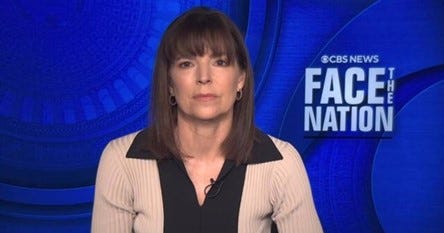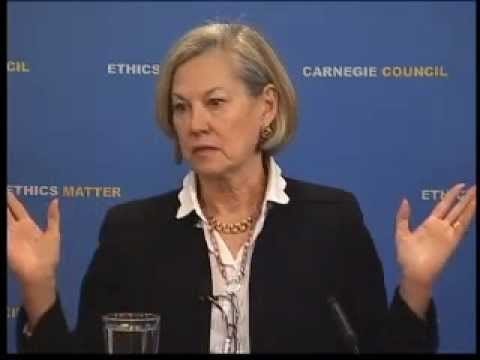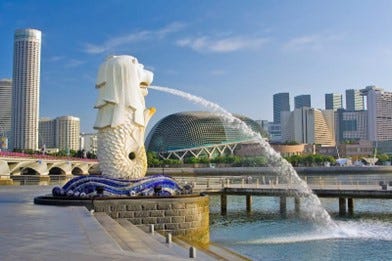The Wall Street Journal: Into the Merlion’s Mouth
Singapore can be a prickly place for journalists to do business
The May 2 decision by the Wall Street Journal to shift its Asia headquarters from Hong Kong to Singapore has to be construed as a devastating blow to Hong Kong and its pretensions to World City status. The Journal is arguably the US’s most respected daily newspaper. The departure follows the New York Times’ 2020 announcement that it would relocate its Hong Kong-based digital news operation to Seoul as China has stepped up its efforts to crack down on press freedom in the city, which formerly boasted perhaps the freest press in Asia.
Hong Kong has now fallen to 135th of 180 countries or municipalities rated by the Paris-based press watchdog Reporters Sans Frontieres. Since the forced implementation in 2020 by Beijing of its draconian national security law, followed earlier this year by the even stricter Safeguarding National Security Ordinance, more than 1,800 political prisoners sit behind bars in Hong Kong according to the Committee for Freedom in Hong Kong; newspapers and websites have been closed, the legislature has been turned into a rubber stamp, and, as Journal Editor-in-chief Emma Tucker pointed out in her announcement, “We are shifting our center of gravity in the region from Hong Kong to Singapore, as many of the companies we cover have done."
But what is especially remarkable about the Journal’s decision to move its headquarters to Singapore is that it was forced to close the news bureau of its now-defunct Asian edition, The Asian Wall Street Journal, in 1988 because of continued independent reporting and editorial comment on the city’s politics, economy, and business community offended the government. I was at that point the Journal’s correspondent there and have been permanently barred from entering the country. The Far Eastern Economic Review, a once-crusading journalistic outlet owned by the Journal’s parent company Dow Jones, was banned but was pirated and printed by the government and circulated to selected people – probably no more than 1,000 — without advertising to punish the magazine.
Remarkably, in testimony in 1995 in a lawsuit against the International Herald Tribune, over what was perceived as an implied insult over Singapore’s "dynastic politics” by columnist Philip Bowring (disclosure: Bowring is a co-founder of Asia Sentinel), the autocratic senior minister Lee Kuan Yew, who had ruled Singapore as prime minister from 1959 to 1990, bragged that he had called Karen Elliott House, then Dow Jones vice-president for International Operations overseeing all overseas publishing including AWSJ and FEER, while she was in Singapore “discussing the details” of the ban with the then prime minister Goh Chok Tong. Lee didn’t provide details of the call during his deposition. But, he wrote, “Finally, I believe in 1992, Philip Bowring (then the Review’s editor) was removed.” In a meeting with the prime minister and the minister for communication and the arts, they made it clear to the House that “we wanted to make it quite sure that the Review understood the terms under which it could operate in Singapore. In other words, no interference in Singapore politics and every misstatement or unjustified stricture will require publication of a reply.”
The limitation on circulation, Lee said, “is slowly being lifted as that message sinks in to the whole staff of the Review.” That message sank in at the Asian Wall Street Journal as well. The ban on having a correspondent in Singapore was also lifted at about the same time. Both publications got the message: don’t mess with Singapore.
That is a message that, 32 years later, is still being delivered to the press, domestic as well as foreign, in Singapore, which itself ranks 126th on RSF’s Press Freedom Index. In 2015, authorities shut down a news site called The Real Singapore as its content was deemed “objectionable to state interests.” The relatively innocuous home-grown Online Citizen was forced to shift its operations to Taiwan after continued harassment and banning by the government. Last September, the government invoked its “Fake News” law, known by the acronym POFMA, against the East Asia Forum, an Australia-based academic website run by the Australia National University’s Crawford School of Public Policy, in response to an August 18, 2023 article by Dr Chan Ying-Kit titled “A spate of scandals strikes Singapore.” Chan later withdrew the article. The Asia Sentinel refused to amend an article on June 3, 2023 titled Killing the Chicken to Scare the Monkeys because it was factually correct and has been permanently banned as a result. In September 2023, the government warned The Economist’s Singapore bureau chief against interfering in domestic politics simply because he had endorsed a new independent media outlet.
Lee Hsien Loong, the son of Kuan Yew, the now-departed prime minister, has announced his intention to step down this month after 20 years in power. Lawrence Wong, a 52-year-old economist and former civil servant, is to replace him, raising questions about whether a kinder, gentler Singapore is in store. It is likely not. The government or the Lee family have filed contempt or defamation suits against most of the major international publications attempting to practice journalism in Singapore and won them all in its captive courts or, as with The Economist, threatened others into backing away from trouble. Lee will stay on as senior minister – the same position his father held from his departure as prime minister until his death -- looking over Wong’s shoulder, should he make any unlikely decisions to lighten up.
Attempts to reach the WSJ’s Hong Kong bureau chief Jonathan Cheng for comment at press time were unsuccessful. In a letter sent to staff and seen by other media, the decision was described as a business move. Emma Tucker, who joined the paper in December 2022 from another of Rupert Murdoch’s UK operations, said in the letter that "Some of these changes are structural: We are bringing together our business, finance and economics coverage. Some are geographic: We are shifting our center of gravity in the region from Hong Kong to Singapore, as many of the companies we cover have done." Tucker was quoted as saying a new business, finance, and economics group would be created with a mandate to "break news and write ambitious and distinctive features, analysis and enterprise." But it is unlikely that the Wall Street Journal, if history is any guide, will write any “ambitious and distinctive features, analysis and enterprise" stories about Singapore.






And where is Uncle Sam in all this? Its always caterwauling about press freedom.
WSJ in 2024 isn't WSJ in the 1990s.
For one thing, WSJ in 2024 is owned by Rupert Murdoch as part of his News Corp. Murdoch is known to have close ties and glowing praise for Singapore and its ruling PAP government, something which drew criticism from a certain Chee Soon Juan in a Guardian op-ed published in July 2011.
https://www.theguardian.com/commentisfree/2011/jul/26/rupert-murdoch-wrong-singapore
This is the same Chee Soon Juan for whom simply giving voice and presence to him earned opprobrium and lawfare attacks from the Singaporean Government and its ruling Lee Family against FEER and WSJ Asia. Something which also has been covered in the past by John Berthelsen here and also Reports Without Frontiers.
https://rsf.org/en/wall-street-journal-asia-unjustly-found-contempt-court-and-fined
So no surprises there why WSJ would relocate to SG now from HK. Highly unlikely anybody left in WSJ today remembers the events of close to 2 decades or more in the past. One has a feeling that had Murdoch been in charge at WSJ in the 1990s, it wouldn't have been the SG government clamping down and openly persecuting WSJ Asia, FEER, Philip Bowring, and John Berthelsen, but Murdoch himself pulling the trigger.
P.S. it's "Killing The Chicken to Scare the Monkeys". I should know. I was the chicken.